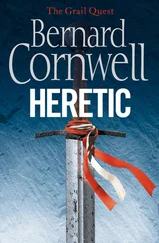1 ...7 8 9 11 12 13 ...24 ‘Nothing of yours,’ Thomas said.
‘What’s mine is mine, boy, and what’s yours is mine if I want it. Mine to take or mine to give. Beggar! You want that girl?’
Beggar grinned behind his beard and jerked his head up and down. ‘Pretty,’ he said. He scratched at the lice in his beard. ‘Beggar likes pretty.’
‘I reckon you can have the pretty when I’m through with her,’ Sir Geoffrey said with a grin and he took the whip from where it hung at his waist and cracked it in the air. Thomas saw that the long leather thong had a small iron claw at its end. Sir Geoffrey grinned at Thomas again, then drew back the whip as a threat. ‘Strip her, Beggar,’ he said, ‘let’s give the boys a bit of pleasure,’ and he was still grinning as Thomas swung his heavy bowstave hard into the teeth of Sir Geoffrey’s horse and the animal reared up, screaming, as Thomas knew it would, and the Scarecrow, unready for the motion, fell backwards, flailing for balance, and his men, who should have protected him, were so intent on the burning Scottish prisoners that not one drew a bow or a blade before Thomas had dragged Sir Geoffrey down from the saddle and had him on the ground with a knife at his throat.
‘I’ve been killing men for four years,’ Thomas said, ‘and not all of them were Frenchmen.’
‘Thomas!’ Eleanor screamed.
‘Take her, Beggar! Take her!’ Sir Geoffrey shouted. He heaved up, but Thomas was an archer and years of drawing his big black bow had given him extraordinary strength in the arms and chest and Sir Geoffrey could not budge him, so he spat at Thomas instead. ‘Take her, Beggar!’ he yelled again.
The Scarecrow’s men ran towards their master, but checked when they saw that Thomas had a knife at his captive’s throat.
‘Strip her, Beggar! Strip the pretty! We’ll all have her!’ Sir Geoffrey bawled, apparently oblivious of the blade at his gullet.
‘Who reads here? Who reads?’ Father Hobbe bellowed. The odd question checked everyone, even Beggar who had already snatched off Eleanor’s hat and now had his huge left arm around her neck while his right hand gripped the neckline of her frock. ‘Who in this company can read?’ Father Hobbe demanded again as he brandished the parchment he had taken from one of the sacks on the back of Thomas’s horse. ‘This is a letter from my lord the Bishop of Durham who is with our lord the King in France and it is sent to John Fossor, Prior of Durham, and only Englishmen who have fought with our King would carry such a letter. We have brought it from France.’
‘It proves nothing!’ Sir Geoffrey shouted, then spat at Thomas again as the blade was pressed hard into his throat.
‘And in what language is this letter written?’ A new horseman had spurred through the Scarecrow’s men. He wore no surcoat or jupon, but the badge on his battered shield was a scallop shell on a cross and it proclaimed that he was not one of Sir Geoffrey’s followers. ‘What language?’ he asked once more.
‘Latin,’ Thomas said, his knife still pressing hard into Sir Geoffrey’s neck.
‘Let Sir Geoffrey up,’ the newcomer commanded Thomas, ‘and I shall read the letter.’
‘Tell him to let my woman go,’ Thomas snarled.
The horseman looked surprised at being given an order by a mere archer, but he did not protest. Instead he urged his horse towards Beggar. ‘Let her go,’ he said and, when the big man did not obey, he half drew his sword. ‘You want me to crop your ears, Beggar? Is that it? Two ears gone? Then your nose, then your cock, is that what you want, Beggar? You want to be shorn like a summer ewe? Trimmed down like an elf?’
‘Let her go, Beggar,’ Sir Geoffrey said sullenly.
Beggar obeyed and stepped back and the horseman leaned down from his saddle to take the letter from Father Hobbe. ‘Let Sir Geoffrey go,’ the newcomer ordered Thomas, ‘for we shall have peace between Englishmen today, at least for a day.’
The horseman was an old man, at least fifty years old, with a great shock of white hair that looked as though it had never been close to a brush or comb. He was a large man, tall and big-bellied, on a sturdy horse that had no trapper, but only a tattered saddle cloth. The man’s full-length mail coat was sadly rusted in places and torn in others, while over the coat he had a breastplate that had lost two of its straps. A long sword hung at his right thigh. He looked to Thomas like a yeoman farmer who had ridden to war with whatever equipment his neighbours could lend him, but he had been recognized by Sir Geoffrey’s archers who had snatched off their hats and helmets when he appeared and who now treated him with deference. Even Sir Geoffrey seemed cowed by the white-haired man who frowned as he read the letter. ‘ Thesaurus , eh?’ He was speaking to himself. ‘And a fine kettle of fish that is! A thesaurus indeed!’ Thesaurus was Latin, but the rest of his words were spoken in Norman French and he was evidently confident that no archer would understand him.
‘Mention of treasure’ – Thomas used the same language, which had been taught to him by his father – ‘makes men excited. Over-excited.’
‘Good Lord above, good Lord indeed, you speak French! Miracles never cease. Thesaurus , it does mean treasure, doesn’t it? My Latin is not what it was when I was young. I had it flogged into me by a priest and it seems to have mostly leaked out since. A treasure, eh? And you speak French!’ The horseman showed genial surprise that Thomas spoke the language of aristocrats, though Sir Geoffrey, who did not speak French, looked alarmed for it suggested Thomas might be a good deal better born than he had thought. The horseman gave the letter back to Father Hobbe, then spurred to Sir Geoffrey. ‘You were picking a squabble with an Englishman, Sir Geoffrey, a messenger, no less, from our lord the King. How do you explain that?’
‘I don’t have to explain anything,’ Sir Geoffrey said, ‘my lord.’ The last two words were added reluctantly.
‘I should fillet you now,’ his lordship said mildly, ‘then have you stuffed and mounted on a pole to scare the crows away from my newly born lambs. I could show you at Skipton Fair, Sir Geoffrey, as an example to other sinners.’ He seemed to consider that idea for a few heartbeats, then shook his head. ‘Just get on your horse,’ he said, ‘and fight the Scots today instead of quarrelling with your fellow Englishman.’ He turned in his saddle and raised his voice so all the archers and men-at-arms could hear him. ‘All of you, back down the ridge! And quick, before the Scots come and drive you off! You want to join those rascals in the fire?’ He pointed to the three Scottish prisoners who were now nothing but dark shrivelled shapes in the bright flames, then he beckoned Thomas and changed his language to French. ‘You’ve really come from France?’
‘Yes, my lord.’
‘Then do me the courtesy, my dear fellow, of speaking with me.’
They went south, leaving a broken stone cross, burned men and arrow-struck corpses in a thinning mist, where the army of Scotland had come to Durham.
Bernard de Taillebourg took the crucifix from about his neck and kissed the writhing figure of Christ that was pinned to the small wooden cross. ‘God be with you, my brother,’ he murmured to the old man lying on the stone bench cushioned by a palliasse of straw and a folded blanket. A second blanket, just as thin, covered the old man whose hair was white and wispy.
‘It is cold,’ Brother Hugh Collimore said feebly, ‘so cold.’ He spoke in French, though to de Taillebourg the old monk’s accent was barbarous for it was the French of Normandy and of England’s Norman rulers.
‘Winter comes,’ de Taillebourg said. ‘You can smell it on the wind.’
Читать дальше












